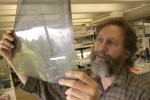Grand result for Deakin
Research news
Deakin University researchers are a step closer to developing a food supplement to improve the survival rate of premature babies thanks to funding through Grand Challenges Explorations.
Grand Challenges Explorations is an initiative created by the Bill & Melinda Gates Foundation that enables researchers worldwide to test unorthodox ideas that address persistent health and development challenges.
Kevin Nicholas, Professor of Bioscience with Deakin’s Institute for Technology Research and Innovation, will pursue an innovative global health research project that aims to unlock the unique properties of wallaby milk to address the high rate of death in premature and low birth weight babies in developing countries.
Grand Challenges Explorations funds scientists and researchers worldwide to explore ideas that can break the mould in how we solve persistent global health and development challenges. Professor Nicholas’s project is one of 110 Grand Challenges Explorations grants of $100,000.
“We believe in the power of innovation - that a single bold idea can pioneer solutions to our greatest health and development challenges,” said Chris Wilson, Director of Global Health Discovery for the Bill & Melinda Gates Foundation. “Grand Challenges Explorations seeks to identify and fund these new ideas wherever they come from, allowing scientists, innovators and entrepreneurs to pursue the kinds of creative ideas and novel approaches that could help to accelerate the end of polio, cure HIV infection or improve sanitation.”
Professor Nicholas and his team will use the wallaby as an experimental model to identify a cocktail of human proteins that will accelerate the development of the gut so that babies are able to absorb the nutrients from breast milk or formula, ultimately increasing their chance of survival.
“In babies born premature or with a low birth weight their underdeveloped gut, along with their lungs, is a major barrier to their survival – their bodies essentially have difficulty handling breast milk or formula,” Professor Nicholas explained. “As adults, these babies also have a higher rate of developing diseases such as diabetes and hypertension.
“We are looking to unlock the unique properties of wallaby milk to guide us in the development of a human supplement that is easy to administer to premature babies, particularly in developing countries.
“The unique nature of wallaby gestation and lactation provides an ideal model for us to investigate.
“The wallaby has a short gestation and gives birth to an immature young that is like a foetus in human terms.
“The key to the survival of the wallaby baby is the rate of production and the composition of the mother’s milk. The proteins (and milk protein genes) change progressively during the lactation cycle to provide nutrition and direct the development of the rapidly growing young in the pouch, prior to weaning. Much of the growth taking place with the wallaby baby in the mother’s pouch would take place in utero with human babies.
“If we can identify the important signalling factors in wallaby milk, we believe will have the key to creating a supplement to help the growth and development of human babies born premature or underweight.”
About Grand Challenges Explorations
Grand Challenges Explorations is a US$100 million initiative funded by the Bill & Melinda Gates Foundation. Launched in 2008, Grand Challenge Explorations grants have already been awarded to nearly 500 researchers from over 40 countries. The grant program is open to anyone from any discipline and from any organization. The initiative uses an agile, accelerated grant-making process with short, two-page online applications and no preliminary data required. Initial grants of $100,000 are awarded two times a year. Successful projects have an opportunity to receive a follow-on grant of up to US$1 million.
Hear Professor Nicholas interviewed by Fran Kelly on ABC Radio National’s Breakfast program.
Share this story
 "We are looking to unlock the unique properties of wallaby milk to guide us in the development of a human supplement that is easy to administer to premature babies, particularly in developing countries," Professor Kevin Nicholas said.
"We are looking to unlock the unique properties of wallaby milk to guide us in the development of a human supplement that is easy to administer to premature babies, particularly in developing countries," Professor Kevin Nicholas said.
